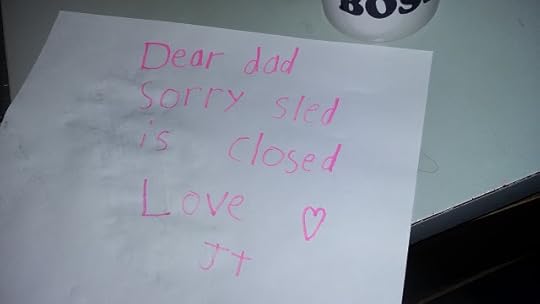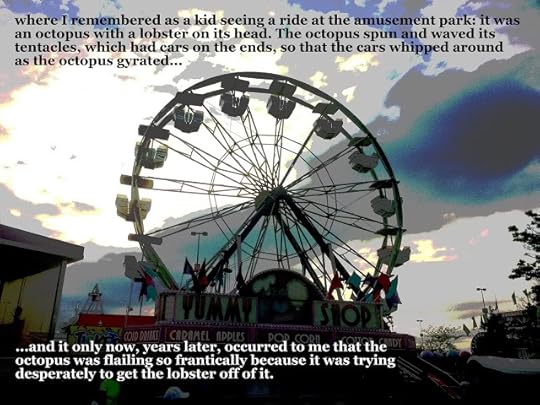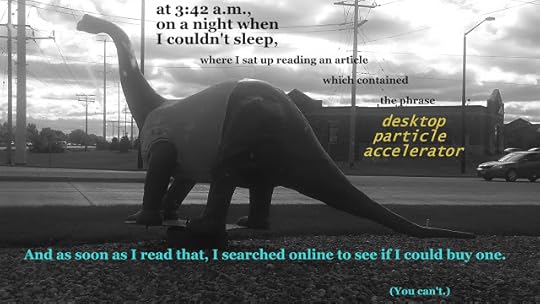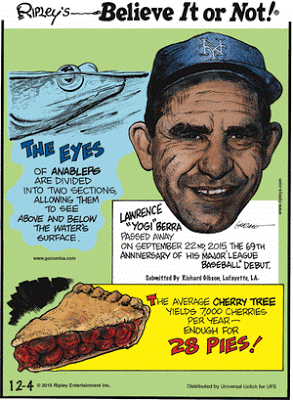Briane Pagel's Blog: Thinking The Lions, page 21
January 24, 2016
Book Six: Star Wars, Inc.
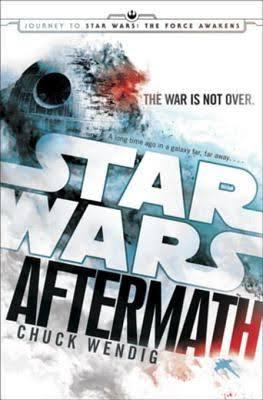 I just finished Book 6, Aftermath, by Chuck Wendig. The story was fine, or better than fine. It was a slightly-above-average space opera, with gangsters, bounty hunters, Star Destroyers, pilots, meetings, betrayals, battle droids, and etc etc., and Wendig did it all in a way that made it a page turner and didn't leave time, or give much reason, to focus on some of the deus ex machina qualities of the story, as time after time people are rescued by sheer luck, or the few annoyances brought on when a writer either deliberately misleads you or forgets what he just wrote. Overall, a B, possibly a B+.
I just finished Book 6, Aftermath, by Chuck Wendig. The story was fine, or better than fine. It was a slightly-above-average space opera, with gangsters, bounty hunters, Star Destroyers, pilots, meetings, betrayals, battle droids, and etc etc., and Wendig did it all in a way that made it a page turner and didn't leave time, or give much reason, to focus on some of the deus ex machina qualities of the story, as time after time people are rescued by sheer luck, or the few annoyances brought on when a writer either deliberately misleads you or forgets what he just wrote. Overall, a B, possibly a B+.Before I get on to the two things I want to talk about with this book, a bit about the annoyances and misleading. I should label this a SPOILER ALERT! but since the things these paragraphs spoil are annoying, I'm not going to bother. These two things involve a thermal detonator, and a TIE fighter.
The first one, the thermal detonator, is either an example of an author deliberately misleading the reader for surprise effect, or of the author forgetting what he wrote. There's a scene in the book where a ragtag band (is there any other kind of band these days? All bands apparently are ragtag) of rebels is planning to sneak into a palace. One of the characters brings in a box of thermal detonators -- grenades-- and another one gets nervous. The first tells the second to relax, explaining that until thermal detonators are armed, they can't explode. She shakes the box and says she could kick it and it wouldn't do anything.
Not long after that, the group is in a tunnel being chased by aliens. This is the sort of thing that pops up in all Star Wars movies, the random alien event. People hated it when the fish kept attacking Qui Gon's boat in Phantom Menace, but: the sand people attacking Luke, the trash compactor monster, the Wampa, the tentacle thing in the swamp on Dagobah, the Rancor and the Sarlacc, the Ewok ambush... and so on. The random alien attack is a hallmark of the Star Wars universe (which makes the giant squid on Han's freighter in Force Awakens no big deal, if not expected or required.)
Anyway, one of the characters takes a thermal detonator and arms it and puts it in the box and they all run, and the entire box of detonators goes off. Which directly contradicts what the author just told us. I know some people will say oh but you know if you put one grenade in a box of grenades... but that's not what the book said. It didn't say they'll only go off if you arm them or they're blown up by something else. What the book said was:
“They don’t go boom if you jostle them. I could kick one and it wouldn’t go off. Until you prime them, these things are basically just shiny rocks.”The blowing up of shiny rocks is not the most annoying turnabout. There's another scene where Norra is flying a TIE fighter, and it gets hit. Wendig had spent most of the previous pages explaining just how fragile TIEs are: they're fast but deadly, etc. etc. because they're so stripped down. When she's hit, Norra realizes she's done for and aims for a group of shuttles some Empire bigwigs are hoping to get into. Just before she crashes she thinks I wish these TIE fighters had ejector seats. Then she crashes, and the next scene is her son trying not to get all choked up by her being dead, as Norra suddenly appears in their meeting point. Turns out TIE fighters DO have ejector seats, and Norra in bracing for the crash accidentally hit it! YAY! Sorry you felt all those feels a moment ago.
There's a lot of that in the book, but those two were the big ones that stick in my mind. Still, even with the flaws, like I said, the book is worth reading if you like Star Wars.
What I really want to talk about is whether I would have read this book if it wasn't a Star Wars book, and how Chuck Wendig maybe won the lottery when he got tapped to write this book.
If you've ever wondered how come there are a jillion varieties of Mountain Dew, or why they keep rebooting old movies and books (I learned this weekend they're going to make another set of Narnia movies, apparently), it's because I read this book. And others read this book. LOTS of others. It's already been reviewed 1,896 times on Amazon, for an average of 13 reviews a day since publication. It's got 7,130 ratings on Goodreads -- and it's only ranked 119 in scifi books on Amazon (1,588th overall, although I expect it was higher for a while.)
To put that in perspective, the #67 scifi book on Amazon is by Terry Pratchett. #65 and #67 are by George R.R. Martin, #62 by Hugh Howey. These are all people with established names. Prior to reading Aftermath I had never heard of Chuck Wendig, and it's doubtful I ever would have. If it wasn't for Star Wars, Inc., the brand, I'd have probably gone my whole life without knowing about Chuck Wendig.
That's not a knock on Wendig, or on Star Wars. Everytime I go to the library, I'm re-amazed at how many books they have: row after row after row, more than I could read in a lifetime even if I did nothing but read -- and that's not counting the ones they've de-shelved or decided not to buy. The odds are simply against finding any book on the shelves.
Aftermath is a perfectly acceptable book -- a pretty good read, not great -- but if I'd picked up a book that didn't have the Star Wars brand on it, and saw that it was about the aftereffects of a civil war in space, featuring a plucky (and ragtag!) group of rebels, I might have put it back down and moved on, since there are lots of books like that, and there would be nothing much to make this one stand out.
To get a book noticed, an author needs great reviews, or a celebrity endorsement, or a lot of luck, or a movie deal, or something. J.K. Rowling proved that when she decided to write a thriller under a pseudonym, and suffered from lackluster sales until someone "accidentally" (wink wink nudge nudge) leaked that Robert Galbraith was J.K. Rowling. Her book had sold 1,500 copies in three months before the leak; after it was revealed (totally accidentally guys honest!) that she wrote it, she sold 18,000 copies in one week.
It's not enough to have a good story; there are lots of good stories. (There are way more bad stories than good ones, but that's for another day.) You've got to get that break -- a break like Harrison Ford had when he ran into George Lucas and was asked to read some scripts for auditions for a new movie, Star Wars.
Chuck Wendig lobbied for the Star Wars job, enlisting a writer friend to help him get it. Most people hadn't heard of him before he got the gig. He seems to have had a slightly-better-than-middling career as a writer, dabbling in screenplays and role-playing games, before landing this job. I don't know if getting it made his other books sell better, but it seems to have helped: one of his books, released in 2011, has only 59 reviews in 5 years. His most recent non-Star Wars books has gotten 113 reviews since August 2015.
The benefit to Chuck Wendig is that he gets to write a book almost guaranteed to become a best seller, and thus become a household name among scifi readers. But there's benefit to readers, too: as I said, I might not have picked up Aftermath if it wasn't Star Wars related.
But when it comes to that, the book is only tangentially related to the movies I love so much. Only two major characters from the movies make an appearance at all, and that's only for a brief time in what seems to be setting up another book either in this series or another seried. (Disney says they're releasing 20 books total to fill in the gaps between Return of the Jedi and The Force Awakens. I doubt I'll read them all.) There are thermal detonators, which Star Wars nerds will recognize as what a disguised Princess Leia was holding to try to get Jabba to release Han. There are mentions of Hutts and brief scenes on Coruscant, Naboo, and Tatooine. There are TIE fighters, Star Destroyers, and A-Wings, as well as a battle droid.
None of these things are truly necessary to the story: if you did a search-and-replace of "TIE fighter" with, say "Viper" the book could just as easily have been a Battlestar Galactica tie-in; I'm not sure if Star Trek had individual fighters, but this could just as easily have been in that universe, too.
So really, the main reason for making it a Star Wars book at all is to simply get that Star Wars logo on the cover-- just like Mountain Dew or any other brand, but the secondary reason, I think, is to anchor the story for the reader in a universe they know.
I've read a bunch of scifi in the past year; China Mieville's Embassytown and Girl In Landscape and The Book Of Strange New Things come to mind, and before that I read The Sparrow, among other great scifi books. Each of them created new worlds, some of them really sticking in my mind -- but in each I had to make up the world almost from scratch, using clues from the author. The one I remember most is Girl In Landscape, which I don't think ever described the main aliens in it. There are aliens called archbuilders, and they are described in one way (furry and frondlike) but I kept picturing them as that weird Muppet that is just a big pipe. I tried to find a picture of it, but I can't. The point is, I didn't really know how to picture the world, which is both good and bad: I enjoyed trying to imagine it and making up my own images, but I was never sure I got it right, in case it mattered.
With Star Wars, as with Star Trek and Battlestar and all other franchises/brands, we get a ready-made world that can have things plugged into them. Just saying "outer rim planet in Star Wars" gets people to think of what that would look like in that universe: dusty, old cities, nearly-broken tech, everything sort of corroded and rundown (a lot like Firefly, too). Star Wars has a brand: Tatooine, the rebel base on Hoth, Dagobah: all scruffy (ragtag!) outposts, whereas the Empire's centers are shiny and cold and Logans-Run-ish. The words Star Wars are a shorthand for what to expect and how to interpret and fill in the gaps in the story. Consider two sentences:
The rebel ducked under the stormtroopers' lasers, then aimed his blaster back to provide cover for the droids as they tried to open the door.
And
The soldier ducked under the guards' volleys, then aimed his own laser pistol back to provide cover for the robots as they tried to open the door.
Those provide probably two very different images. Just the word droid alone (which Lucas has copyrighted and so maybe you can't even use it in another story) connotes a specific kind of image.
That's the case with all major brands: if I tell you something came from McDonalds you will know what to expect. Same with Apple, or Coke or any other brand. Star Wars, for good or bad (mostly good, I think) has become a brand, like anything else. It's no longer just a creative idea or a good set of movies or the EU or anything. It's a brand. It's the Burger King of scifi stories.
I wrote, the other day, a long piece on why people seem to want to think there's something wrong with The Force Awakens. I don't know if I'll publish that, but I will bring up one comment about it that lots of people make: that it's too corporate, that it caters to the fans too much, that it seems to just remix and update the earlier movies.
Well what do you expect? I LOVED The Force Awakens, but I'm on record as saying McDonald's Cheeseburgers are the greatest food ever invented. But seriously, when something has become brand -- as being bought by Disney shows it has -- it can't help but cater to the fans. Everytime a brand tries something new it gets destroyed over it, losing money and retreating back into its brand-ness. If Star Wars had rebooted into something different, people would have gone insane. Look what happened when George Lucas tried to put a serious spin and some politics into his movies with the prequels. People hated it. And that was only halfway into the creation of Star Wars, Inc. Suppose they had made Luke Skywalker a villain? Or had the Empire not have a doomsday weapon? People would probably have freaked out.
Once something becomes a brand, the creators lose control of it, a bit. A while back, we DVRd the Toy Story Halloween special to pre-watch to see if the boys would like it. 10 minutes into it, we gave up: it wasn't the Toy Story we'd come to like and we deemed it too scary for the boys. Toy Story has been a brand since it was created -- as has Pixar, which is why their movies have started seeming a little disappointing to people. They can't take risks anymore.
It's not necessarily a bad thing. Superhero comics only started taking risks about 50 years into the art form, and even then they repeal everything and recreate it and declare it alternate universes and the like. Superman can't die, and Aunt May can't come back to life, but that doesn't mean that you can't have a lot of great stories within those strictures. You might even stretch the boundaries a little, permanently, if you're given enough time (I understand that Doc Ock is now Spider-Man, or at least was for a while.) But mostly you're stuck with the format you came to the prom with.
Aftermath shows both the good and the bad of that. It's a perfectly serviceable story that a middling-talented writer like Wendig begged to write, because his story of plucky (ragtag!) rebels on a distant planet would have died a quiet, lonely death if it didn't have Star Wars glommed all over it; and I never would have read a perfectly serviceable story if it wasn't for the existence of Star Wars, Inc. But the more things become brands the less creativity there will be overall. I'd rather read one great book by China Mieville or Mary Doria Russell (or David Mitchell or Kim Stanley Robinson or Andrew Leon or Nigel Mitchell or Bryan Pedas & Brandon Meyers) than 20 "perfectly serviceable" Star Wars books that can't get beyond the boundaries of their brand-ness.
Published on January 24, 2016 19:13
Where in the universe is Randall Munroe?
In this XKCD comic strip:
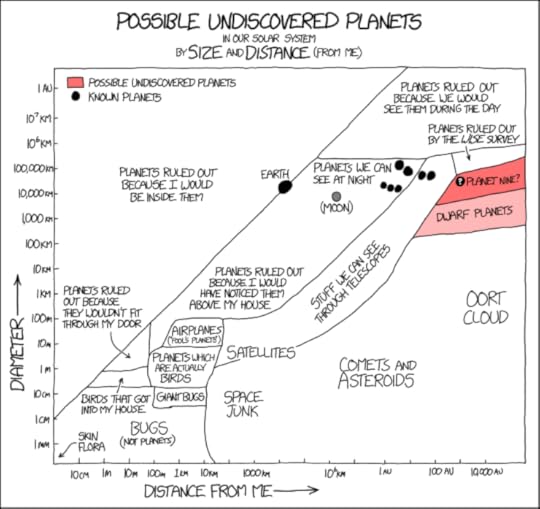
artist Randall Munroe, former NASA employee, reveals that he is somewhere between 1,000 km and 10,000,000 km from the Earth.
Published on January 24, 2016 06:05
January 23, 2016
Either this is the best antique store in the world...
Published on January 23, 2016 16:12
So Mr Bunches Didn't Want To Go Sledding Today...
Published on January 23, 2016 05:39
January 22, 2016
American Bandstand
The singer who appeared most on "American Bandstand" was Freddy "Boom Boom" Cannon. He appeared 110 times.
Freddy "Boom Boom" Cannon's hit song was Palisades Park.

Palisades Park was written by Chuck Barris. Barris created The Gong Show and claimed to have killed 35 people while working for the CIA in the 1970s.
The CIA denies Barris ever worked for them.
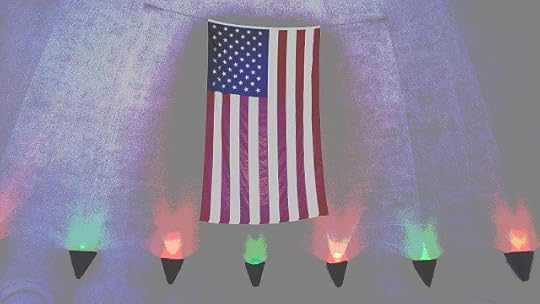
That's just what you'd expect them to do, of course.
Published on January 22, 2016 19:11
January 19, 2016
I had this moment
Published on January 19, 2016 19:05
I had this moment
Published on January 19, 2016 01:45
January 18, 2016
I don't know that's kind of a lot I guess?
Published on January 18, 2016 04:45
January 17, 2016
Book 5: Piers Anthony's Xanth Books Are Like My Childhood Or Something I Don't Know It's A Metaphor
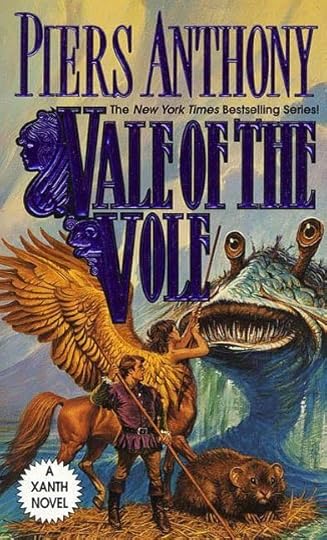 We went to a friend's wedding once and because I was one of the people chosen to read a passage from the Bible at the wedding (I did so with such verve that another friend was impressed: You really put a lot of emotion into it! he marveled) I had to go to the 'rehearsal dinner' the night before. (Rehearsal dinners are silly. They don't cover anything that you couldn't take care of in five minutes before the actual ceremony. Oh, the groom stands on this side? Got it. Good thing I had to buy an extra meal for 25 for this.)
We went to a friend's wedding once and because I was one of the people chosen to read a passage from the Bible at the wedding (I did so with such verve that another friend was impressed: You really put a lot of emotion into it! he marveled) I had to go to the 'rehearsal dinner' the night before. (Rehearsal dinners are silly. They don't cover anything that you couldn't take care of in five minutes before the actual ceremony. Oh, the groom stands on this side? Got it. Good thing I had to buy an extra meal for 25 for this.)At that dinner, Sweetie and I, as grown-ups, got the chicken meal: chicken and a potato and some tired beans or something. The kid at the table with us got chicken strips, with crunchy skin, french fries, and I think Jell-O.
After a moment, when they served, I said "Well now I want the kid's meal," and Sweetie agreed with me. The other adults at the table looked embarrassed for me.
Piers Anthony's Xanth books are like that for me: Something that theoretically I should be over and not enjoy anymore, but I still do. Book Number 5 was Vale Of The Vole, and I chose to read it because while reading Owen Meany I was thinking about some of the books I've read in my lifetime that have stuck with me for years-- decades, now -- and never been forgotten. Most of them are the kind of pulpy paperback scifi/fantasy books that my Mom hated (my mom was someone who would never have served chicken strips and fries to adults at a party, let alone ice cream in coffee cups with forks, as we once did when we ran out of bowls and spoons at a family gathering). Alan Dean Foster and Piers Anthony, especially, loom large in my memories of favorite books as I collect hardcover versions of the books I love most of all.
Just like Star Wars has remained stuck in my mind as the greatest movie ever (I'm talking about Episode IV, A New Hope), the Xanth Books have stayed on the top shelf of my mind for nearly 3 decades now, since I bought A Spell For Chameleon at the bookstore in the strip mall in Delafield where we used to go play at the arcade and (in winter) go on the cross-country ski trail behind it.
It's weird that I still remember exactly where I bought that book, in fact. And that I remember so much of it. I've read books, great books, that I can hardly recall a single moment of. (American Gods, by Neil Gaiman, for example, and this one book that was about a giant hotel a guy built that was sort of weird and I remember it vaguely as being good but can't remember the title or author, Jonathan Franzen's The Corrections). But some silly-ish books that are mostly puns and which contain far less action than they do intellectual puzzles of a sort, and expository dialogue, those are cemented into my brain.
That's probably not an accident, for two reasons. First, back then there was far less to occupy a person. When I was a teenager, there was no internet and even when we got cable TV it wasn't all that interesting. There was one newspaper a day, and magazines, but the local library was it as far as books went -- that or Waldenbooks, or the independent bookstore at the strip mall. So I re-read books a lot more than I did now; when you read 1-2 hours a day (more in the summer) and you have a limited number of books, that's what's going to happen. So the first 6 Xanth books I probably read 5 or 6 times each, at least, in between other books.
(That's why I love living the future so much: When I finished book 5 last night, I went to sleep secure in the knowledge that I could, in the morning, literally buy any book I felt like instantly, if I so chose. Then I didn't have to because I was able to borrow a book I've been waiting for, simply by clicking a few links on my library site.)
The second reason is that genre books are actually more likely to be liked and be memorable. I read an article after Terry Pratchett died that talked about how it's easier to become a bestselling author writing genre books rather than literary books, for a variety of reasons, but the one that I think applies best is that they hold up to re-reading so readily. When I think about how many times I've watched The Avengers or The Dark Knight, about how many times I've re-read a scifi or fantasy novel, compared to literary books or period dramas or other 'serious' adult endeavors, it's no comparison. Maybe it's different for other people, although I kind of doubt it: genre books and movies are, like all great junk food, hard to put down and addictive, even when you've read them before.
So I decided, as part of my 100 books, to finish the Xanth series. I'd read and practically memorized the first 6, ending with Night Mare, and clearly recalled reading 7, 8 and 9, too -- but the 10th one, Vale of the Vole, I didn't recall reading at all. This was a book released originally in 1987, when I was turning 18 and going off to college, and in the years after I turned 18 I'd go to school, drop out of school, spend a few years working at a gas station and a factory, break my neck in a car accident, have surgery, and move to Milwaukee and get my own apartment, so it's not all that surprising that I wasn't re-reading a lot of books in that period; I had a lot of other stuff going on. Unlike the first 6 (all published by 1983, and so all available when I picked up the first one that day in Delafield) I didn't get a chance to go over Vole again and again.
So when I got it from the library, and started reading it, it took me a few minutes to realize that I had, in fact, read it before -- but then it was in that sweet spot where I couldn't remember anything about the book so as I read it I kept thinking oh, yeah, that's right, and hey I remember that part.
You can go home again, it turns out, and everything isn't smaller or duller or anything. Piers Anthony still holds many of the same charms for me: I recognize that the books are sort of silly and that the dialogue and writing is a bit clunky and that the puns are getting increasingly more oblique as the series goes on, but I don't mind. Like Bugs Bunny cartoons and Star Wars and Peanut Butter Cap'n Crunch and other things from when I was a kid, I enjoy them in a completely unironic fashion.
The plot itself is always sort of secondary to a Xanth book, but the plot of Vole is: Esk, the son of a nymph/ogre couple, is feeling dissatisfied, so he sets out to find the Good Magician Humfrey and ask how he can protect his family from a demon. He runs into Chex, a winged centaur, and Volney, a vole, each of whom has their own mission: Chex wants to know why she can't fly, and Volney wants to save his home, the Vale of the Vole, from a demon invasion. The three of them end up teaming up on a quest to find help for Volney, and along the way meet an assortment of magical characters and have to try to solve various puzzles.
The Xanth books have less action than many fantasy books, and the magic is of the simple, deus ex machina kind, but as simplistic as the books can feel, Xanth really is a well-thought-out and intricate world, on a par with Middle-Earth or Hogwarts. True, Piers Anthony doesn't invent a language, but all the details of his world are thought out and stay consistent, and he even gives some thought to the ramifications of various aspects -- such as in the first books when the humans realize that the magic in Xanth is building up to unusual levels and causing humans to slowly die out.
They're not probably going to win a Nobel prize for literature, but people could do worse than getting hooked on the Xanth series. I heartily recommend reading everything Piers Anthony ever wrote -- you could get to 100 books easily given everything he's written; my mom used to also say that she suspected "Piers Anthony" was a pseudonym for a group of writers the way Babysitters Club books or the like are -- but definitely start with the Xanth books. And while you should start with number 1, don't worry about sequence. The order of the books is kind of important but each one can be enjoyed without too much backstory, and Anthony explains whatever you need to know.
PS: When I went to reserve the next one, I found out they're shelved in the adult section which I guess makes sense given some of the events in them. They're PG-13, I'd say.
Published on January 17, 2016 06:30
Why I Hate People: How Come Everybody Wants To Poop Gold?
 In case you needed another reason (I don't, I have zillions) to hate people, in January Nestle Japan will release a limited edition of gold-leaf covered Kit Kat bars. Each one will cost around $17, which is roughly the average cost per person of providing clean drinking water to a third-world region. But, hey, clean drinking water so babies don't die, or gold poop in your toilet? I know where the rich people land on that one.
In case you needed another reason (I don't, I have zillions) to hate people, in January Nestle Japan will release a limited edition of gold-leaf covered Kit Kat bars. Each one will cost around $17, which is roughly the average cost per person of providing clean drinking water to a third-world region. But, hey, clean drinking water so babies don't die, or gold poop in your toilet? I know where the rich people land on that one.PS Technically this is an investment; pure gold is chemically inert and passes right through your body so all the rich have to do is sift through their feces and they can get their gold back. That's probably how they became rich in the first place.
PPS No lie Jonathan Franzen wrote a scene about exactly that in his book Freedom.
Published on January 17, 2016 05:25
Thinking The Lions
Do you think people invented "Almond Joy" and then thought "we could subtract the almonds and make it a completely different thing?" or did they come up with "Mounds" first and then someone had a brot
Do you think people invented "Almond Joy" and then thought "we could subtract the almonds and make it a completely different thing?" or did they come up with "Mounds" first and then someone had a brother-in-law in the almond business? And anyway did you ever notice that the almond creates a little mound and that "Mounds" are flat?
I'm probably overthinking this. ...more
I'm probably overthinking this. ...more
- Briane Pagel's profile
- 14 followers



